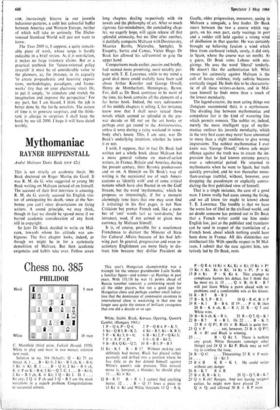Mythomaniac
RAYNER HEPPENSTALL
Andre Malraux Denis Boak (ouP 42s)
This is not strictly an academic thesis. Mr Boak doctored on Roger Martin du Gard. It was R. M. du G. who suggested to young Mr Boak writing on Malraux instead of on himself. The account of their first interview is amusing. R. M. du G. crossly accused his English visi- tor of anticipating his death, since at the Sor- bonne you can't enter dissertations on living writers. A sound principle, we may think, though in fact we should be spared more if we barred academic consideration of any book still in copyright.
So later Dr Boak decided to write on Mal- raux, towards whom his attitude was am- biguous. The first chapter looks, indeed, as though we might be in for a systematic demolition of Malraux. But then academic exigencies and habits take over. Follow seven long chapters dealing respectively with six novels and the philosophy of art. After so much rigorous fair-mindedness, the concluding chap- ter, we eagerly hope, will again release all that splendid animosity, but no. One after another, it dutifully compares Malraux with Dostoiev sky, Maurice Barres, Nietzsche, Spengler, St Exupery, Sartre and Camus, Victor Hugo. Dr Boak has allowed his self-control to gain the upper hand.
Comparisons made earlier, passim and briefly, had seemed more promising, most notably per- haps with T. E. Lawrence, while to my mind a good deal more could usefully have been said about Arthur Koestler and George Orwell, Henry de Montherlant, Hemingway, Byron. For, dull as Dr Boak contrives to be most of the time, his book contains all the elements of a far better book. Indeed, the very tediousness of his middle chapters is telling. I, for instance, know now that I shall never reread those novels which seemed so splendid in the pre- war decade or fill out on the art books or perhaps ever get round to the Antimemoires, unless it were during a rainy weekend in some- body else's house. This, I am sure, was Dr Boak's underlying intention, whether he knew it or not.
I wish, I suppose, that in fact Dr Boak had written not a whole book about Malraux but a more general volume on man-of-action writers, in France, Britain and America, during the present century, their Byronic predecessors and so on. A blemish on Dr Boak's way of writing is the occasional use of such Ameri- canisms as 'identify with' and of some critical notions which have also floated in on the Gulf Stream, but the word `mythomania; which he proposes so interestingly, if for a moment alarmingly (one fears that one may soon find it irritating) in his first pages, is not New Criticism but prewar French and, like a num- ber of 'anti' words (art as `anti-destin; for instance), used, if not coined or given new currency, by Malraux himself.
It is, of course, possible for a reactionary Frenchman to distrust the Minister of -Stale for Cultural Affairs -because of his bad left- wing past. In general, progressives and even re- actionary Englishmen are more likely to dis- trust him because they dislike President de
Gaulle, older- prOgressives, moreover, seeing in Malraux a renegade, a lost leader. Dr .Boak steers between the two a course which sug- gests, on his own part, early veerings to port and a rudder still held against a strong wind of disillusion in that quarter. He was certainly brought up believing fascism a wind which blew from starboard (which, surely, it did only - in Spain, where the course was set north). At a guess, Dr Boak votes Labour with mis- givings. He uses the word 'liberal' tenderly. He doesn't like the authoritarian left. What rouses his .animosity against Malraux is the cult of heroic violence, truly sadistic because erotically tinged. He finds this to be characteris- tic of all those writers-as-hero, and in Mal- raux himself he finds more than a touch of the lowest mendacity.
The legend-creator, the man acting things out (Jungians recommend this), is a mythomane. The dividing line between mythomaniac and compulsive liar is the kind of wavering line which permits osmosis. The nobler or, indeed, merely the more intelligent type of mytho- maniac outlives his juvenile mendacity, which in the very best cases may never have amounted to more than a slight readiness to give wrong impressions. The noblest mythomaniac I ever knew was 'George Orwell,' whose sole major offence against the truth was to create the im- pression that he had known extreme poverty over a substantial period. He returned to mythomania when he went to Spain, but truth quickly prevailed, and he was thereafter more- than-average truthful, without, however, ever dropping the pseudonym or explicitly contra- dicting the first published view of himself.
That is a single instance, the case of a good man. I know really bad cases among the living, and we all know (or ought to know) about T. E. Lawrence. The trouble is that we have the worst law of libel in the civilised world, and no doubt someone has pointed out to Dr Boak that a French writer could sue him under English law, just as the publisher and translator can be sued in reskect of the translation of a French book about which nothing could have been done in France. All this diminishes our intellectual life. With specific respect to M Mal- raux, I submit that the case against him, ten- tatively led by Dr Boak, rests.






































 Previous page
Previous page